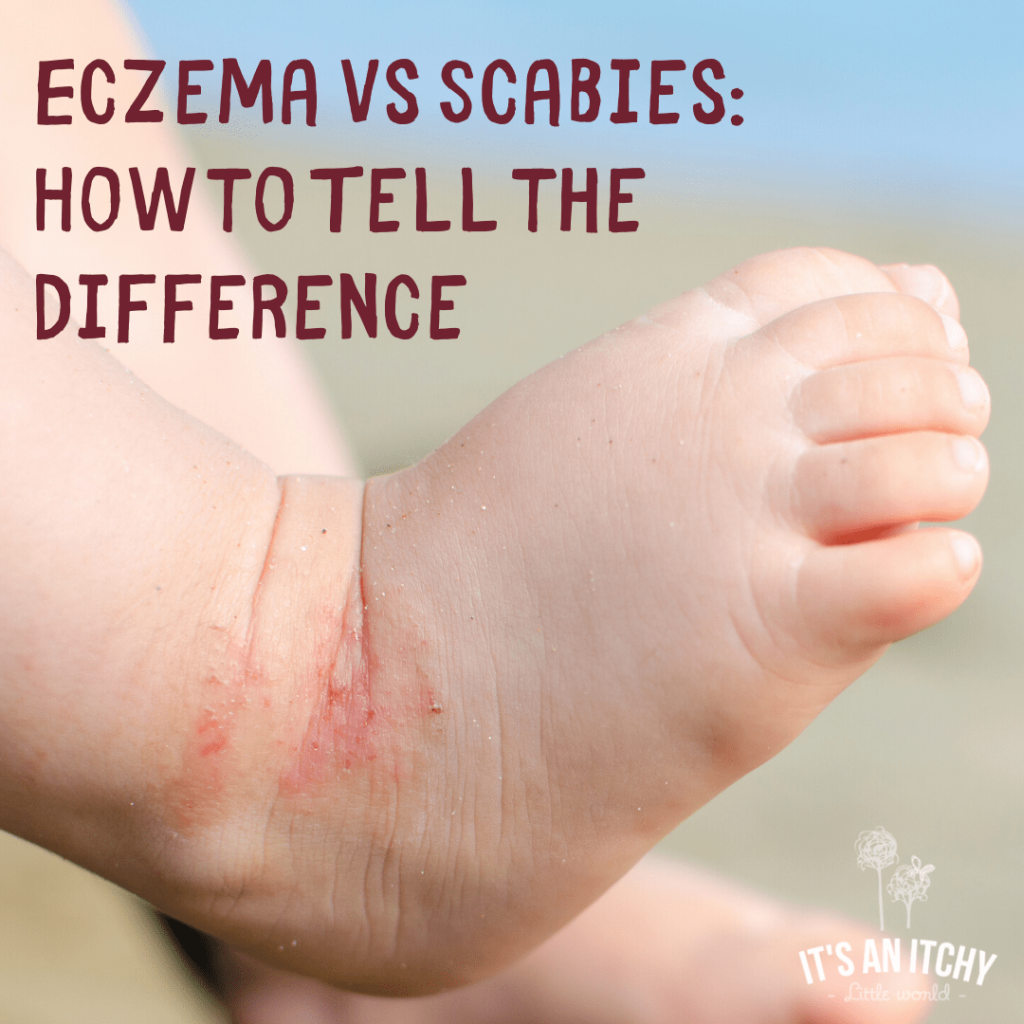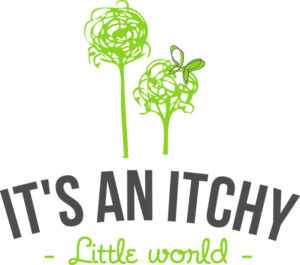Eczema vs. Scabies: How to Tell The Difference

Let’s talk about eczema vs. scabies. Both are skin conditions characterized by itchy, red rashes. However, while they may look quite similar, they are, in fact, very different skin conditions with different causes and different treatment options.
If you are suffering from eczema or scabies, please bear in mind that we are in no way medical professionals. If you are experiencing severe symptoms or infections, speak to a medical professional as soon as possible.
What is Eczema?
Eczema is an inflammatory skin condition caused by a damaged skin barrier. Unable to properly retain moisture, the skin develops patches of red rashes that are dry, scaly, and extremely itchy. There are several types of dermatitis, with the most common type being atopic dermatitis.
What is Scabies?
Scabies is a skin condition that causes itching and rashes. It affects millions of people every year of all races, ages, and socioeconomic status. Highly contagious, it spreads through close physical contact and by sharing clothing, bedding, and any furniture that is infested with mites.
It typically occurs in children and young adults. This is most likely because of outbreaks in schools and childcare facilities.
Causes of Eczema
The exact cause of eczema is unknown but research suggests that it develops because of a combination of environmental and genetic factors. A person may experience a flare-up after exposure to an irritant — many of them common house-hold objects. Typical triggers include airborne allergies (dust, dampness, housemites, molds), fabric and chemical irritants (wool, polyester, soaps, laundry detergent), extreme weather conditions, stress, and even the food you eat.
Causes of Scabies
Scabies is caused by an infestation of a mite called Sarcoptes scabiei, an eight-legged microscopic mite. This mite lays eggs and lives within the first layer of skin, causing an allergic reaction in the body due to its eggs and waste. The scabies mite can live without a human host for 48-72 hours. Scabies can spread indirectly after coming into contact with items that have been used by an infected person.
Difference in Symptoms
Itchiness is a prime factor for both skin conditions. While those with eczema typically develop patches of red and scaly skin, with scabies, the rash usually has pimple-sized bumps appearing within it. Lines resembling hives or bites appear on the skin where the mite burrows into the skin. Blisters or sores may appear, especially if a person continuously scratches at their skin. This can lead to a secondary infection with Staphylococcus aureus. Those with eczema can also develop blisters that seep a clear liquid and leave the skin more vulnerable to infection if the skin breaks.
The first time a person is exposed to a scabies mite, it can take up to six weeks for symptoms to appear. Those with eczema may go weeks or even months at a time without displaying symptoms, but are more prone to flare-ups.
If you suspect you or a loved one may be infected with scabies, it’s important to seek medical care as soon as possible to avoid infecting others.
Dyshidrotic Eczema vs Scabies
Dyshidrotic Eczema is similar to scabies in that a person will also develop small blisters on their skin. For dyshidrotic eczema, the blisters usually appear on the hands and the feet. Usually the blisters will clear in 2 or 3 weeks, leaving the skin red, dry, and cracked. With both conditions, the blisters are extremely painful and itchy, and scratching increases the risk of infection.
Natural Treatment Options
Those with scabies must be diagnosed with a doctor to be treated with prescription medication called a scabicide. It’s important to follow the treatment directions to avoid reinfestation or passing along the scabies.
While eczema is a chronic condition, there are some natural treatment options to manage symptoms and avoid flare-ups. Here are some of our favourites:
Organic Manuka Skin Soothing Cream – Gentle and extremely nourishing, this oil-based balm is perfect for treating dry skin. Handmade with just 6 ingredients, it’s sure to soothe skin without any burning or stinging. Your sensitive skin will love its gentle touch!
You can also soothe foot eczema blisters, cracks, or dry skin with these hypoallergenic eczema socks for adults or kids. Find relief and quicken the healing process thanks to these TENCEL/lyocell socks that fit like a second skin.
Another great way to combat itching and spot treat inflamed areas is with these Remedywear™ eczema bandages. Embedded with zinc oxide, known for its anti-inflammatory properties, they can be worn alone or under clothing without any added bulk.
Share your best skincare tips in the comments!
References:
https://www.healthline.com/health/scabies-vs-eczema#treatment
FROM: Eczema

Thanks for this very brief yet very enlightening knowledge with a comparison between eczema and scabies! Now I am informed and corrected from the misconceptions and wrong knowledge with both of these seemingly same skin irritations.
There’s a lack of useful information on the Internet which may enable someone to differentiate between atopic dermatitis and scabies. I’m none the wiser. Is dermatitis less itchy than scabies?
Close up photos of scabies and atopic dermatitis and the differences would be helpful.
I agree I would like to help make some online content for this issue. I have suffered with severe scabies which has lead to infection of Staphylococcus aureus, I hope I am healing at the moment but seem to have lots of symptoms of Atopic Dermatitis and it’s making me feel so terrified as it looks like small scabies bites and I think it possible could be. I’m not sure how to tell the difference. But thinking back to when the scabies was most intense I remember the scabies bites being bigger than the scratched pimples from an atopic dermatitis flare up. To be honest I don’t know but if you are getting better from scabies day by day I hope you are on the right track. The itch continues but less and less each day. If you also suffer from the Staphylococcus aureus infection it is very important to treat this as it can also cause more itching
I have dyshidrotic eczema and nothing seems to help! It’s never been confused with scabies but I agree the itching is unbearable!
Sorry but I’m still waiting on how to tell the difference.
The title should have been: eczema AND scabies: ithey are very similar, in fact they itch
Lol I came to see if anyone else had the same thought when they read that…. and I see you did. HOW do you tell the difference??!! I know technically what the difference is but how one can TELL the difference…. I’m still at a loss same as you. Jeez the medical stuff is getting as bad as YouTube with seeming Cluckbait
This in no way distinguished between the two. Once you differentiated one, you similarized them again. And vice versa all the way up to the end leaving readers with nothing. Unprofessional. Leave it to the professionals !
This does describe the difference between the two, it’s under the section ?????????? ?? ????????. It quite clearly explains:
?????? causes ??????? of ??? and ????? skin and it’s possible to also develop ???????? ???? ???? ? ????? ??????.
With ??????? the rash usually has ??????-????? ????? appearing within it– lines ?????????? ????? or ?????– and blisters or ????? may appear, (especially with continued scratching). The risk of infection with the staphylococcus bacteria is higher with scabies.